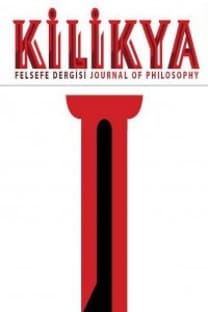“Güçlü Program” ve Ussallık Tartışması
Güçlü Program, Bilimsel Yöntem, Bilgi Sosyolojisi, Ussallık, Barry Barnes, David Bloor
“The Strong Programme” and the Rationality Debate
Strong Programme, Scientific Method, Sociology of Knowledge, Rationality, Barry Barnes, David Bloor,
___
- Bacon, Francis [1620] (1900). Novum Organum, translated by R. Ellis and J. Spedding, London: George Routledge & Sons, Limited.
- Barnes, Barry (1974). Scientific Knowledge and Sociological Theory, Routledge and Kegan Paul, London and Boston.
- Barnes, Barry and David Bloor, 1982: “Relativism, Rationalism, and the Sociology of Knowledge”, in Rationality and Relativism, eds., by M. Hollis and S. Lukes, Oxford: Basil Blackwell.
- Feyerabend, Paul (1975). Against Method, New Left Bookstore: London.
- Laudan, Larry (1984). “The Pseudo-Science of Science?”, in J. Brown (ed.) Scientific Rationality: The Sociological Turn, Dordrecht: Reidel.
- Lukes, Steven (1995). “Some Problems about Rationality” in Readings in the Philosophy of Social Science, ed. by M. Martin and L.C. McIntyre, London: MIT Press.
- McCarthy, Thomas (1988). “Scientific Rationality and The ‘Strong Program’ in the Sociology of Knowledge” in Construction and Constraint, ed. by E. McMullian, Notre Dame: Notre Dame University Press.
- Rescher, Nicholas (1977). Dialectics: A Contraversy-Oriented Approach to the Theory of Knowledge, SUNY.
- Shapere, Dudley (1982). “The Concept of Observation in Science and Philosophy”, Philosophy of Science 49: pp.485-525.
- Winch, Peter (1958). The Idea of a Social Science and Its Relation to Philosophy, London: Routledge & Kegan Paul.
- Winch, Peter (1970). “Understanding a Primitive Society”, in Rationality, ed. by B. R. Wilson, Harper.
- Yayın Aralığı: 2
- Başlangıç: 2014
- Yayıncı: Eray Yağanak
Martin Heidegger'in Teknoloji Görüşü: Özcü Eleştiriye Bir Cevap
Değer Çatışmaları Sorununda Bir Olanak: Duyguların Eğitimi
Platon ve Heidegger’de Aletheia ve Sanat Yapıtı İlişkisi
John Locke’ta Sözcüklerin Kurulumundan Toplumun Kurulumuna Uzlaşım Unsurunun Rolü
“Güçlü Program” ve Ussallık Tartışması
Stalnaker’s Hypothesis: A Critical Examination of Hájek’s Counter Argument
